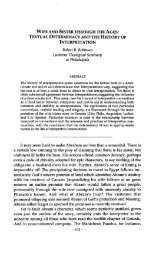FROM EXEGESIS TO HERMENEUTICS - Rice School of Pastoral ...
FROM EXEGESIS TO HERMENEUTICS - Rice School of Pastoral ...
FROM EXEGESIS TO HERMENEUTICS - Rice School of Pastoral ...
Create successful ePaper yourself
Turn your PDF publications into a flip-book with our unique Google optimized e-Paper software.
Schneiders: From Exegesis to Hermeneutics 35the new event <strong>of</strong> meaning which reading constitutes. Like the musicianplaying Mozart or the actor playing Hamlet, the interpreter is "performingthe text" and the performance is satisfying, illuminating, and transformingto the extent that it is both faithful to the text and creativelyoriginal in execution. 42The aspect <strong>of</strong> Gadamer's thought which is most important for ourpresent discussion is his analysis <strong>of</strong> the act <strong>of</strong> understanding a text. 43Gadamer, unlike Ricoeur, regards the dialogue as an illuminatinganalogue for interpretation. 44 He maintains that in reading a text, as in areal conversation, the purpose is not simply to understand the other or toagree with the other but to come, with the other, to an understanding <strong>of</strong>the truth about the subject matter under discussion. 45 He critiques classicalnineteenth century historical criticism for refusing to engage thesubject matter <strong>of</strong> the biblical text at the level <strong>of</strong> its truth claims. Theromanticist historical critic, says Gadamer, stops short at the question,what does the text say? By isolating the text's content in its own historicalworld which is assumed to be a closed horizon <strong>of</strong> meaning completelyisolated from the horizon <strong>of</strong> the contemporary reader, the criticrefuses to really dialogue about the subject matter. 46Such a critic,Gadamer implies, is like the person who says to a conversation partner,"I understand what you are saying and can see why you think and feel asyou do" but who refuses to say whether he or she agrees with the speakeror not. The listener records what the other says but refuses to talk aboutthe subject matter. Thus, neither partner risks his or her position, i.e.,faces the challenge to change.For a real conversation, says Gadamer, and thus for a real interpretation<strong>of</strong> a text, the partner must indeed make every effort to understandwhat the other is saying but also enter into serious discussion aboutwhether what the other is saying is the truth about the subject matter ornot. This cannot be done without bringing into play what one thinksabout the subject, being unwilling either to simply give it up if itdisagrees with the text's position nor to nullify the text's position be-42This analogy with musical interpretation, which I first explored in "Faith, Hermeneutics,and the Literal Sense <strong>of</strong> Scripture," Theological Studies 39 (December 1978),719-36, occurred to me as 1 meditated on Gadamer's illuminating analysis <strong>of</strong> the play asclue to ontological explanation in Truth and Method, pp. 91-118. It has proven useful fordiscussing the tension between fidelity and originality in interpretation.43This is the burden <strong>of</strong> Part Π, section II <strong>of</strong> Truth and Method, pp. 235-341.44See Truth and Method, pp. 325-41. This difference between Ricoeur and Gadameron the subject <strong>of</strong> the dialogue as model for interpretation is not contradictory. Ricoeurregards dialogue from the standpoint <strong>of</strong> its character as event (which is superceded bywriting) in contrast to its meaning which survives transcription. Gadamer, however, isfocussing on the characteristic <strong>of</strong> dialogue as genuine engagement <strong>of</strong> a mutually interestingsubject-matter by two partners (which interpretation implies) as opposed to a purelyphenomenological description or reconstruction <strong>of</strong> what was said.45Gadamer, Truth and Method, pp. 262-64.^Ibid., pp. 267-70.



